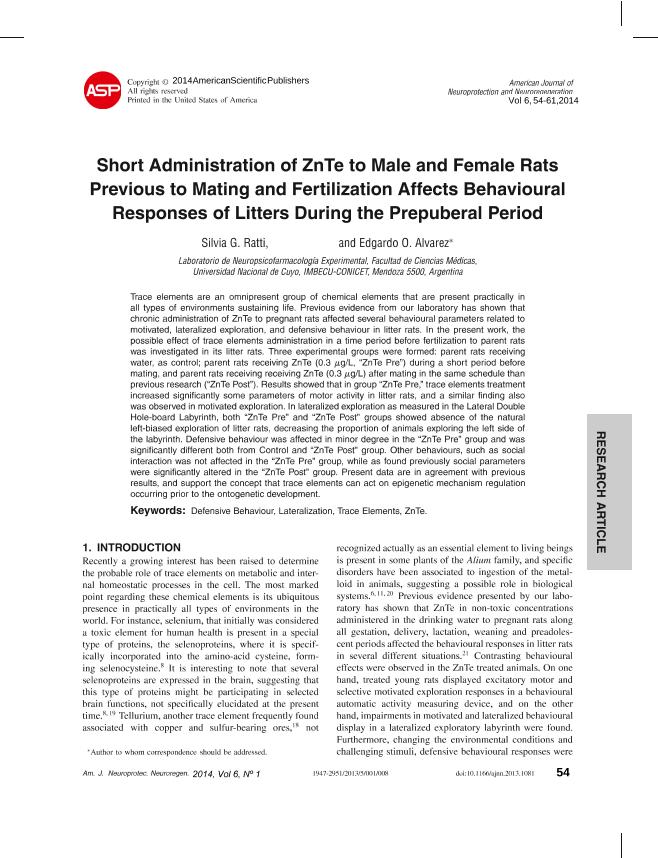Mostrar el registro sencillo del ítem
dc.contributor.author
Ratti, Silvia Gabriela

dc.contributor.author
Alvarez Toro, Edgardo Orozimbo

dc.date.available
2018-01-02T18:55:20Z
dc.date.issued
2014-10
dc.identifier.citation
Alvarez Toro, Edgardo Orozimbo; Ratti, Silvia Gabriela; Short administration of ZnTe to male and female rats previous to mating and fertilization affects behavioural responses of litters during the prepuberal period; American Scientific Publishers; American Journal of Neuroprotection and Neuroregeneration; 6; 1; 10-2014; 54-61
dc.identifier.issn
1947-2951
dc.identifier.uri
http://hdl.handle.net/11336/32025
dc.description.abstract
Trace elements are an omnipresent group of chemical elements that are present practically in all types of environments sustaining life. Previous evidence from our laboratory has shown that chronic administration of ZnTe to pregnant rats affected several behavioural parameters related to motivated, lateralized exploration, and defensive behaviour in litter rats. In the present work, the possible effect of trace elements administration in a time period before fertilization to parent rats was investigated in its litter rats. Three experimental groups were formed: parent rats receiving water, as control; parent rats receiving ZnTe (0.3 g/L, “ZnTe Pre”) during a short period before mating, and parent rats receiving receiving ZnTe (0.3 g/L) after mating in the same schedule than previous research (“ZnTe Post”). Results showed that in group “ZnTe Pre,” trace elements treatment increased significantly some parameters of motor activity in litter rats, and a similar finding also was observed in motivated exploration. In lateralized exploration as measured in the Lateral Double Hole-board Labyrinth, both “ZnTe Pre” and “ZnTe Post” groups showed absence of the natural left-biased exploration of litter rats, decreasing the proportion of animals exploring the left side of the labyrinth. Defensive behaviour was affected in minor degree in the “ZnTe Pre” group and was significantly different both from Control and “ZnTe Post” group. Other behaviours, such as social interaction was not affected in the “ZnTe Pre” group, while as found previously social parameters were significantly altered in the “ZnTe Post” group. Present data are in agreement with previous results, and support the concept that trace elements can act on epigenetic mechanism regulation occurring prior to the ontogenetic development.
dc.format
application/pdf
dc.language.iso
eng
dc.publisher
American Scientific Publishers
dc.rights
info:eu-repo/semantics/openAccess
dc.rights.uri
https://creativecommons.org/licenses/by-nc-sa/2.5/ar/
dc.subject
Defensive Behaviour
dc.subject
Lateralization
dc.subject
Trace Elements
dc.subject
Znte
dc.subject.classification
Salud Ocupacional

dc.subject.classification
Ciencias de la Salud

dc.subject.classification
CIENCIAS MÉDICAS Y DE LA SALUD

dc.title
Short administration of ZnTe to male and female rats previous to mating and fertilization affects behavioural responses of litters during the prepuberal period
dc.type
info:eu-repo/semantics/article
dc.type
info:ar-repo/semantics/artículo
dc.type
info:eu-repo/semantics/publishedVersion
dc.date.updated
2017-12-29T14:14:55Z
dc.identifier.eissn
1947-296X
dc.journal.volume
6
dc.journal.number
1
dc.journal.pagination
54-61
dc.journal.pais
Estados Unidos

dc.description.fil
Fil: Ratti, Silvia Gabriela. Consejo Nacional de Investigaciones Científicas y Técnicas. Centro Científico Tecnológico Conicet - Mendoza. Instituto de Medicina y Biología Experimental de Cuyo; Argentina. Universidad Nacional de Cuyo. Facultad de Ciencias Médicas; Argentina
dc.description.fil
Fil: Alvarez Toro, Edgardo Orozimbo. Consejo Nacional de Investigaciones Científicas y Técnicas. Centro Científico Tecnológico Conicet - Mendoza. Instituto de Medicina y Biología Experimental de Cuyo; Argentina. Universidad Nacional de Cuyo. Facultad de Ciencias Médicas; Argentina
dc.journal.title
American Journal of Neuroprotection and Neuroregeneration
dc.relation.alternativeid
info:eu-repo/semantics/altIdentifier/doi/https://doi.org/10.1166/ajnn.2014.1081
dc.relation.alternativeid
info:eu-repo/semantics/altIdentifier/url/http://www.ingentaconnect.com/content/asp/ajnn/2014/00000006/00000001/art00009
Archivos asociados
